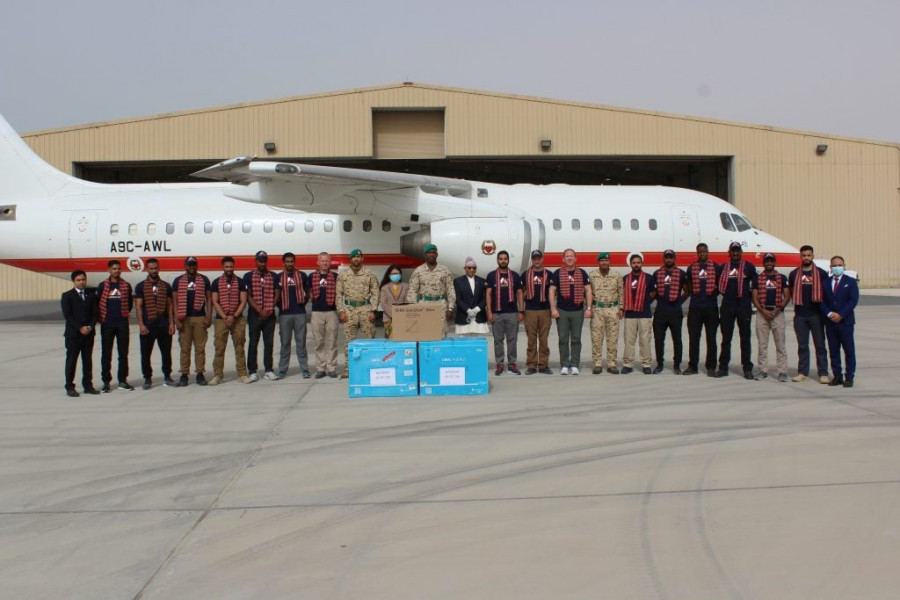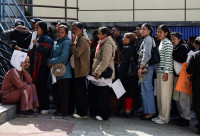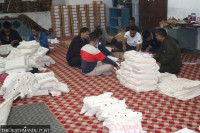National
Vaccines brought by Bahraini prince, which are under probe, are Chinese, officials say
Nepal’s drug regulator says it is consulting with foreign and health ministries to find a way out, as the issue is not just technical but also concerns bilateral ties and diplomacy.
Arjun Poudel
A report on an investigation into how 2,000 doses of Covid-19 vaccine were brought to Nepal by a Bahraini prince was to be submitted on Thursday evening.
But officials on Thursday afternoon said that the vaccines were Chinese, not AstraZeneca as claimed before.
At least two officials at the Health Ministry, who did not wish to be named, said that the vaccines from Bahrain are Chinese and developed by Sinovac Biotech, for which Nepal has not granted emergency use authorisation.
A Department of Drug Administration official, however, said the Bahraini prince had brought Sinopharm.
“The vaccines they [the Bahraini team] brought here are from the Beijing Institute of Biological Product, which means it’s Sinopharm,” Santosh KC, spokesperson for the Department of Drug Administration, told the Post.
Which company manufactured the vaccine holds a lot of significance, as Nepal has granted emergency use approval to Sinopharm’s BBIBP-CorV but not to Sinovac’s CoronaVac.
Nepal, however, has not rolled out Sinopharm vaccines yet.
The Oxford-AstraZeneca vaccine was the first to get emergency use authorisation in Nepal. The vaccine, manufactured by the Serum Institute of India under the brand name of Covishield, is currently being used in Nepal.
Sheikh Mohamed Hamad Mohamed al-Khalifa, the Bahraini prince, and his team landed in Kathmandu on Monday on an Everest mission.
The Nepali embassy in Bahrain on Monday said in a statement that the prince’s team will be carrying 2,000 doses of AstraZeneca vaccine, which will be administered to the locals of Samagaun of Tsum Nubri Rural Municipality in Gorkha district. The team will stay in Nepal for 80 days, according to the statement.
The team was in Nepal in October last year to climb Lobuche and Manaslu mountains.
Officials told the Post on Tuesday that though the vaccines were brought in good faith, the process failed to comply with the rules stipulated by the country’s drug regulator for importing such items.
“The Department of Drug Administration has the right to confiscate any vaccine or medicine that is brought into the country without permission or if such items are not allowed in the country,” Dr Roshan Pokhrel, chief specialist at the Ministry of Health and Population, told the Post.
Officials said some more unusual events too have come to light—that the vaccines were quickly loaded onto an ambulance and taken to a private hospital in Kathmandu, only to be taken back to the airport warehouse for storage later.
Deo Chandra Lal Karna, spokesperson for the Tribhuvan International Airport, said they do have cold storage facilities where vaccines can be stored in both import and export sections.
So far, all the vaccines imported by the government of Nepal and those supplied under the COVAX facility are moved directly to the storage facility of the Department of Health Services.
A Health Ministry official said the vaccines now will be handed over to the Department of Drug Administration.
Officials from the department said that they have been waiting for the directive from the Health Ministry on the ways to resolve the Bahrain vaccine issue.
“It is a highly sensitive issue and also of diplomatic concern,” Bharat Bhattarai, director general at the department, told the Post on Thursday afternoon. “We are waiting for some directives from the Health Ministry.”
The department had launched a probe into how the Bahrain prince carried 2,000 doses of Covid-19 vaccines to Nepal without a prior approval.
The drug inspectors deployed for investigation were given until Thursday evening to furnish their report.
“We can say more only after we receive a report from our drug inspectors,'' Bhattarai told the Post on Thursday afternoon. The Post’s attempts to contact him later in the evening for updates failed, as his mobile was switched off.
A communication mix-up was blamed for the arrival of vaccines from Bahrain, as officials told the Post on Tuesday that the Ministry of Foreign Affairs was in the know about the Bahraini prince bringing the vaccines but the Health Ministry was not.
The Nepali drug regulator also said no prior approval was taken.
To import any medicine or vaccine into Nepal, relevant documents as well as storage guarantee of cold chain maintenance and expiry dates must be provided to the drug regulator.
According to KC, spokesperson for the Department of Drug Administration, anyone importing any medicine or vaccine into Nepal must fulfil necessary legal procedures stipulated by the country.
However, nationalnews.com, a United Arab Emirates-based news portal, said on Thursday that the Bahraini prince flying into Nepal with 2,000 doses of a coronavirus vaccine “had all the required paperwork”.
“To clarify, the Bahraini team arriving in Nepal had full approval to enter the country with a shipment of 2,000 vaccine doses,” the nationalnews.com quoted a government spokesperson. “This approval was received before flying to Nepal from the Nepali ambassador to Bahrain.”
According to the government official, reported the paper, the Nepali embassy in Bahrain has written to Bahrain’s Ministry of Foreign Affairs to confirm the issue and to apologise for any confusion within the Nepali government, and subsequent media reports on the matter.
The online news portal also said the vaccines that the prince planned to donate to a village in Nepal were developed by AstraZeneca.
Santosh KC, spokesperson for the Department of Drug Administration, said that his office has been coordinating with the foreign and health ministries to resolve the issue.
“We are in constant touch with the concerned agencies under the Health Ministry and the Foreign Affairs Ministry,” KC told the Post earlier on Thursday.
In the statement issued on Tuesday, Padam Sundas, Nepal’s ambassador to Bahrain, expressed his happiness about Bahrain’s interest in mountain climbing in Nepal and said that it has helped strengthen Nepal-Bahrain relations. He also thanked the government of Bahrain for providing the Covid-19 vaccines.
The Post’s attempts on Thursday to talk to Sundas also failed, as his phone was switched off too.
Officials said they are trying to resolve the issue of vaccines from Bahrain at the earliest as the failure to do so could hurt bilateral relations. Many Nepalis go to Bahrain for work. According to the Nepali embassy in Manama, around 25,000 Nepalis are currently staying in Bahrain.
The agency that is managing the Bahraini team’s Everest mission told the Post on Tuesday that the Nepali embassy in Bahrain had requested around 1,000 doses of vaccine.
“The 1,000 doses of vaccine were requested by the Nepali embassy itself and another 1,000 doses were given by Bahrain on its own,” an official at the Seven Summit Treks, the agency handling the prince’s Everest expedition, told the Post on Tuesday. “As per the plan, the team was expected to see the Health Ministry officials at the airport to take the vaccine and store them.”
Public health experts said the authorities concerned should resolve the issue diplomatically at the earliest.
“There seems to be no ill-intention in bringing the vaccines. The Bahraini team brought the vaccines as a gift, in a gesture of goodwill,” Dr Baburam Marasini, former director general of the Epidemiology and Disease Control Division, told the Post. “It’s our government agencies that have made the matter unnecessarily complicated. It looks like a clear case of communication mix-up.”
This article has been updated to include a fresh quote of the spokesperson of the Department of Drug Administration in the fifth para.




 21.88°C Kathmandu
21.88°C Kathmandu














